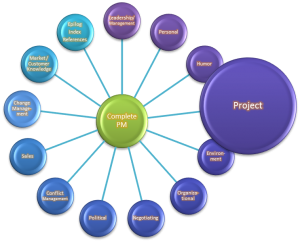Complete project managers build upon the foundation established by PMI’s Guide to the Project Management Body of Knowledge. A needed contribution is to add insights and examples as aids for complete project managers in their quest to make sense of and apply the PMBOK®. While this guide provides a basic structure for projects, the rest of the story involves practice, ingenuity, and learning from
others in order to achieve breakthrough performances.
Project management competence is the ability to perform a specific task, action or function successfully. We live in difficult business times, so organizations are looking for competent project managers. Project management competence goes beyond words. It is
leader’s ability to say it, plan it, and do it in such a way that others know that you know how, and know that they want to follow you. And you close the loop to learn from each project. People admire project managers who display high competence spanning not only the project management process but also related and necessary disciplines. They are professionals always ready to learn and always moving one step beyond. They are people who overcome a fear of making mistakes, people able to recognize better ways to get the job done, and they are able to learn from successes and failures and from others. Competence is a key to credibility, and credibility is the key to influence others. Most team members will follow
competent project managers.
Every problem has causes and effects. In order to make a convincing argument that a project is required to solve a particular problem, it is beneficial to include the causes and effects of the problem in the definition. A Problem Statement answers the following questions:
• Why is this project necessary? Which problem, situation, or need justifies the project?
• How do we know that the need exists?
• How is it currently handled?
• How does the problem affect things like productivity, teamwork, profitability, or other crucial factors?
• How will the project solve the problem or take advantage of the opportunity?
A Vision Statement is a vivid description of a desired future state when the project is successful. It is unique to the project and stakeholders know when that new state is realized. You can seize only what you can see. A great leader’s courage to fulfill a vision comes from passion, not position. Make it a common practice to develop a vision statement for every project.
A common shortcoming is to focus on a benefit you are providing (an output) and not articulating the benefit of the benefit (the outcome—value in business terms). Outputs are actual deliverables or products/services. Outcomes are the success criteria or measurable result of successful completion of the outputs. Emphasis is often placed on collecting outputs with little attention paid to outcomes. But outputs may have little intrinsic value unless they are linked to outcomes. For
example, a complete project manager might state, “By initiating a project office to coordinate our portfolio of projects [output], we select the right projects to meet our strategic goals and provide the key set of services required by our end users [outcome].” These statements have a strong project management process behind them.
A student asked, “In one project management class, it was emphasized that the project manager cannot make certain decisions. Is that a general statement or are there different scenarios in which the project manager cannot make decisions?” I responded, “I would not accept a general statement that a project manager cannot make certain decisions, but I believe decision-making capability is situation and organization dependent as well as dependent on the ability, maturity, and personality of the project manager. It may be necessary to earn the right to make certain decisions based on building up credibility through on-the-job experiences.”
Producing unique project results is the aim of the project management process, spanning the gamut from initiating to closing each and every project. A foundation from the body of knowledge is a starting point. Throughout the journey, seek best practices in each phase of the project life cycle and apply them.
Randy Englund, Englund Project Management Consultancy, www.englundpmc.com


Somehow I didn’t notice that this was part of a series. Thanks for bringing that to my attention. For me, understanding how these different areas integrate into a holistic approach to managing and leading projects is what I find interesting and consider crucial for success. Nice series!
Michael,
You use “But” in your comment about successful project managers having interpersonal in addition to project management skills. The point of our material is to use an “And” statement. I hope you read the other postings in my series about “The Complete Project Manager” because the intent is to elaborate on exactly the areas that you itemize as well. Being “complete” means integrating technical, people, and organizational skills. A narrow focus is limiting. The project management profession is a wonderful opportunity to develop and apply multiple skills to order to contribute mightily to organizational success.
I agree that a Project Manager needs to have a solid understanding of project management skills. But a successful PM will also have a good grasp of interpersonal skills including communication, leadership, and teambuilding as well as personal effectiveness skills such as time management, goal setting, and decision making. Good article!